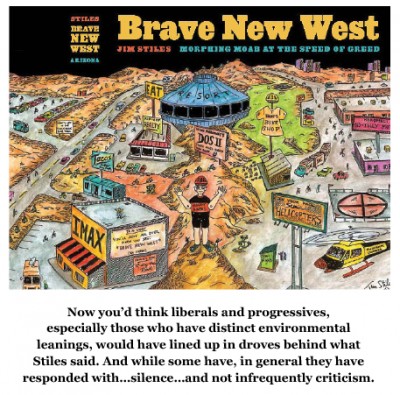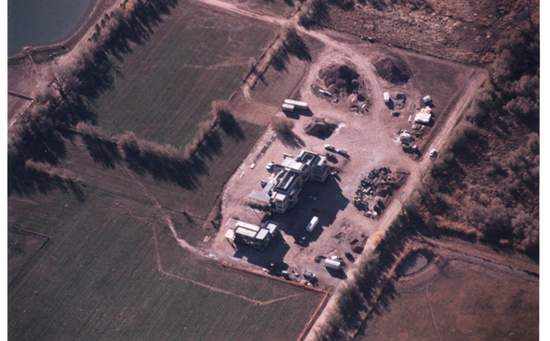“There are two different types of change: one that occurs within a given system which itself remains unchanged, and one whose occurrence changes the system itself.” – Watzlawick, Weakland, and Fisch, from their book Change.
For years now Jim Stiles has been writing about the metamorphosis of Moab, Utah, from an isolated yet welcoming uranium mining village to a high end municipality: welcoming to streams of tourists yet unaffordable for mere mortals to live in. And focusing particularly on the economic boom that has made it so. The increases in two-to-four wheeled traffic and visitation that have accompanied this juggernaut have obliterated the treasured spiritual solitude that Arches and Canyonlands national parks once offered while leaving their physical beauty untouched (good for smart phone photographs).
As he says, the amenities economy has come.
In addition Stiles has been writing about the odd financial symbiosis between mainstream environmentalism on the one hand and certain industrial tycoons on the other; David Bonderman among them. Not simply because these tycoons are loaded with money, but because a number of their massive investments fly in the face of the values that environmentalists ostensibly stand for; and that the esteemed elders of environmentalism without a doubt stood for.
Now you’d think liberals and progressives, especially those who have distinct environmental leanings, would have lined up in droves behind what Stiles said. And while some have, in general they have responded with…silence…and not infrequently criticism.
Huh?
That was my initial reaction for sure. Then I started contemplating what they’d said.
Which goes more or less like this. They had few complaints overall about the amenities economy because, as they said, it provides local jobs and business opportunities without overtly mangling the landscape, in contrast to the mining and oil and gas industries and arguably cattle ranching – the so-called extractive industries. Nor is the amenities economy a threat to the boundaries of national parks and monuments, wilderness areas, or national forests. In fact many found it hopeful that protecting the physical integrity of the land can mean money for local communities. What, they wondered, is wrong with that?
And when it came to those big pocket financial contributions to environmental groups they pulled out an even bigger stick of pragmatism. Pointing out as follows: first, that lobbying on an ongoing basis is necessary to protect vulnerable ecosystems, second that good lobbyists are expensive, and third that environmental groups need to pay competitive salaries to have competent staff with the expertise to analyze and respond to complex legal and regulatory issues. They concluded that to operate in the real world major money is necessary, that therefore wealthy donors are essential, and that environmental organizations cannot afford to be judgmental about what those donors invest their other money in.
At first blush such responses sound like good old talkin’ in the kitchen common sense (to borrow a phrase from politicians everywhere). Until, that is, we consider what systems change in environmental matters actually involves.
The quandary is that when one or more elements in a system change, even seemingly significant elements, the system will typically adapt to that and continue to function as it has before. While some changes will be visible they will be incremental and if anything simply become other moving parts in more of the same.
Yet we’ve long had a consequential equation, I = P x A x T, more properly a schema, delineating what environmental systems change is. Although not complete or mathematically precise, IPAT shows what essential environmental systems change involves, making it fairly obvious when it’s happening and (more likely) when it isn’t.
It should come as no shock that influential people the world over don’t like what IPAT has been telling them for the last 45+ years. And that most Americans, to the extent they’re aware, don’t either.
Now let me lay out the IPAT schema:
Impact = Population x Affluence x Technology.
“Affluence” refers to the natural resources consumed per capita, which always has some degrading effect on the environment, however minor. Increases in population also have a degrading effect. So, for example, if the population decreases but consumption per person increases they may cancel each other out with no net environmental improvement.
“Technology” on the other hand is a neutral term: if our predominant profiteering mindset continues technology will continue to increase the consumption of natural resources per capita, as it has since the outset of the industrial revolution in the 18th century, and particularly since 1950. On the other hand if at this point technology is utilized wisely, with the well-being of future generations and other species in mind, it would do much to lessen environmental impacts. An example would be the widespread but careful application of solar energy with an eye toward significantly reducing the consumption of natural resources per person, instead of trying to use it to shore up the same old mass consumption.
So let’s apply IPAT to what Jim Stiles has said. What are its implications?
Twofold as I see it. First and foremost is the plain issue of affluence, as above defined. This is exactly where so many liberals and progressives are as bogged down as any hidebound conservative. Those liberals and progressives themselves will tell you that they’re as green as can be and are eager to protect the environment. But alas, that is mere self-perception. In fact, the bottom line for them remains economic prosperity; the American Dream of having MORE is still the boss. And that means that overall their commitments to environmentalism will remain cosmetic and that the resulting impacts will continue to degrade flora, fauna, and the wildness of the land.
Yet surrendering that American Dream, at least as we’ve known it, is exactly what IPAT shows us is necessary. While it is certainly important to protect “topo maps” of land from development, and to protect designated species as well, that is nevertheless incremental change, and ultimately more of the same, as the amenities economy shows us all too well. By contrast a systems change would have to be a bottom-up mass movement, particularly in privileged countries, of people setting personal examples of humble living: i.e., small house, smallish car if any, unassuming income, and so on. It would be an unglamorous downscaling of our consumption, necessarily with wide public support.
Given the lack of such public support, however, coupled with a titanic failure of political imagination in high places, those who are trying to live humbly are finding potholes all over the road. For one thing, it’s considerably more expensive to eat organically and buy an eco-car, as admirable as these things are in the abstract. With the ironic result that the people who are acquiring ecological status among their neighbors are more affluent: that is, earning and spending more per capita.
That’s why creative and efficient government planning, including a generous array of intelligently designed programs, is sorely needed in order to make lower consumption more workable and less absurd for everyone.
What does setting an example of living modestly mean for a person who is truly wealthy to begin with? There must be a number of such people, hopefully many, who are willing to consider taking such a question seriously, and even some who may have taken meaningful steps. And still others who, while they may be willing to make sizeable contributions to environmental groups and otherwise engage in philanthropy, have thus far felt no obligation to question the opulence of their own lifestyles. And I’m guessing plenty more who have little concern about whatever lies outside their immediate interests. In any case, I do have some questions and thoughts for the truly wealthy – at least hypothetically.
Do you have a private jet? Or a twin-engine plane? Then sell it. Better yet, scrap it. You’re not such an important person that you can’t fly, when you need to, by commercial airliner. And if you can hack it psychologically, sit in the economy section with us plebeians. You can talk to us and learn from us that way, and frankly you need to.
For that matter, wield your influence and invest your wealth in rebuilding and renewing train travel and other mass public transportation, powered with renewable energy. So we can phase those airliners out (except for any that may someday fly on renewable energy). In doing this bear in mind that you may well have the clout to make a crucial difference here in a way we ordinary citizens cannot.
How big is your house? If it’s larger than 2,000 square feet sell it for as little as you can stand to a non-profit agency that can make efficient use of the space to help people in need. And if you have more than one house, including condos, sell them too.
Go ahead and buy another house as long as it doesn’t exceed 2,000 square feet, and that’s energy efficient to the nines, remembering that most of your fellow citizens can’t accomplish that without meaningful government programs to help them out.
If you have any money in fossil fuels or other industries that emit greenhouse gases, sell your interests tomorrow morning and put your money in renewable energy, doing all you can to promote its responsible use.
Lobby for what actually helps people. To the degree you don’t know what will actually help them (no offense but you probably don’t), then get out there and talk to enough of them to find out. And include professionals who actually work with people in need day in and day out and who choose to live modestly themselves.
If you are already doing that kind of lobbying – thanks.
And if you are in any way investing in or promoting sulfate aerosol geo-engineering, see your priest immediately and ask for absolution. Then join a viable movement that is working to ban it forever.
And buy a damn eco-car.
Having thus spoken to the rich folks, I want to comment at least briefly on the amazing advances in computer technology. They’ve been coming at us so fast that we’re replacing our laptops, tablets, and smart phones every year or two now. To an astonishing degree these devices are altering the way human beings communicate (and vastly shortening the human attention span). Anthropologists are scratching their heads over its effect on our culture.
But you know what hasn’t changed? It seems like every time we’re on the internet advertisements are shouting at us or crawling across our screens like insects, as we struggle to paw through them. And they’re all about one thing: increasing our consumption per capita. So when it comes to environmental impacts our society’s great techno whiz-bang, whatever else it is, isn’t a systems change. It’s a regression on steroids.
I conclude that IPAT is indeed in sync with the simple gist of what Jim Stiles has been saying, as his comments toward the end of his 2007 book Brave New West reveal: “Why aren’t we demanding that we all pursue a simpler, less consumptive life style?…
…
“Liberal Democrats aren’t much different from conservative Republicans in one regard: neither group wants to see Americans live with less. Republicans think we should continue to live extravagantly and are convinced our energy resources will last forever. Democrats want to be able to live as extravagantly, but think we can live extravagantly in a more energy-efficient manner…No one is out there on the political landscape willing to ask U.S. citizens to live with less.” (pp. 241-242.)
I believe this is precisely why erstwhile liberals and progressives have responded to Stiles with…silence…and not infrequently criticism.
SCOTT THOMPSON is a regular contributor to the Zephyr.
He lives in Beckley, WV.
To read the PDF version of this article, click here.
To comment, scroll to the bottom of the page.
Don’t forget the Zephyr ads! All links are hot!












Hot damn – somebody besides my lonesome is talking about I=PAT.
Let’s start a band!
Though I love I=PAT too, accurate as it is in teaching a philosophical truth, its main issue is the horribly unfair time delay between the PAT cause and the Earth Impacts that result.
(of course Pope Francis, often echoing, yep, The Canyon Country Zephyr on capitalism and consumption, and who goes somewhat beyond Naomi Klein by including a severe critique of our new electronic society, still, like Naomi, fails to emphasize the P term in relation to its mathematical importance in the equation…like all the rest of humanity, his view is anthropocentric, and therefore still in denial…)
And though selling fossil-fuel assets might make people feel good (the only result of progressive activism it usually appears to me) it’s certainly not effective…somebody’s buying on the other side of the transaction, likely at a very good price for them. Much better would be steep and rising taxes on all fossil fuel energy, making absolutely everything about our civilization utterly impossible…only then we might actually confront what global warming is.